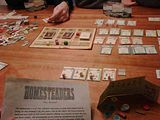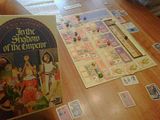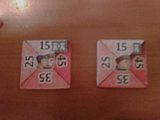
Last review I mentioned the value of learning a new game in terms of one you already know, and this seems to be a recurring theme in my gaming lately. Up for consideration this time is game that yet again takes place in the Runebound / Descent universe: Runewars. Runewars is very much like some of the other wargaming offerings that have come out of Fantasy Flight games, such as the Twilight Imperium expansion (which carried TI to a whole new level) and StarCraft, thanks to designer Corey Konieczka.
This means that a game as epic as Runewars was taught to a group of new player in just under 20 minutes. Explaining things in terms of Twilight Imperium made learning the game a snap. The concept of different races having different strengths, activations of hexes for combat, and determining initiative by the actions you take that round, all are familiar concepts for Twilight Imperium players.
There are some notable differences, starting with the gameboard. Gone are the individual terrain hexes, and now hexes are group together in different arrays. Terrain arrays are also numbered and determine what quests are available to your heroes. Also gone are the dice that determine the results of combat. New to the game is the Fate deck, a stack of cards that determine how successful your units are in a fight. The interesting thing about this is that it allows players to choose their battles based on the cards drawn from the Fate deck. Let’s my squad of archers are ready to attack an opponent, and we’ve just had a battle involving an opponents skeleton’s archers. Since their both the same class of unit, they’ll use the same successes on Fate cards. Now if that battle went badly for them, and they drew almost no successes or special abilities, I might be more inclined to attack knowing that the successes are coming. It’s an interesting new twist in choosing your battles.
The last difference is a big one. You now have the possibility of controlling one or more heroes, who quest for you and allow you to obtain more victory points on their own. Heroes work differently than other units, as their not actually units for you. They are mercenaries, and rarely even affect the clashing of armies that happen around them. It’s integrated surprisingly well into the game, and doesn’t feel like a distraction.
Overall, the game feels like it takes an appropriate spot in the Runebound series. Runewars is the macrocosm, Runebound is focused on the quest, and Descent focuses on the battles in the quest. Runewars plays very smoothly, and the bits are really awesome. Especially nice are the mountain parts of the map that give the playing board a nice visceral texture. This is an awesome game, with my only complaint being the presence of only four playable races. It screams for an expansion, and once we get that it’s sure to be one of our favorites for a long time to come.
Also, it gives us yet another opportunity to ogle Red Scorpion:

Ahhh, Red Scorpion…




